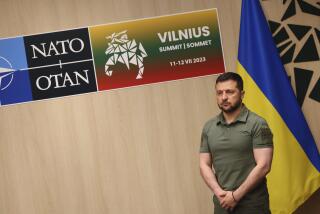Distrust Milosevic, and Verify
- Share via
The United States and our NATO allies appear close to achieving victory in our war with Serbia. Should Serbia’s dictator, Slobodan Milosevic, capitulate to NATO demands that he withdraw his forces from Kosovo and allow a NATO peacekeeping force to protect returning Kosovars, our victory will prove historically important. We will have proved to a skeptical world that NATO is still relevant in the post-Cold War era, and we will be seen by friend and foe alike as willing and able to defend our interests and values well into the new century. That is very good news for the United States, for NATO and for the world.
Had we failed to impose our will on a third-rate adversary, the damage done to our credibility, and, consequently, to our security, would have been calamitous. This war was worth fighting.
But our past experiences with Milosevic have taught us that his word is not his bond. Even if he has agreed to all our terms, we will have to closely monitor his compliance with the terms of the agreement. We would be well advised to adhere to a variation of an old Reagan maxim: distrust and verify.
We shouldn’t be in a hurry to cease air operations until most if not all of Milosevic’s forces have withdrawn from Kosovo. Of course, we shouldn’t shoot retreating soldiers in the back, but we should continue to strike militarily significant targets in Serbia as a means of keeping Milosevic honest. Most important, NATO’s leaders must retain the political will necessary to resume full-scale operations should Milosevic revert to form and violate the agreement. Milosevic may be betting that once NATO leaders have declared the war over, they would be reluctant to interrupt public celebrations of victory with the unwelcome news that our adversary has resumed his belligerency, and must again be stopped by force of arms. NATO must be prepared to instantly punish even small violations of the accord or risk losing in peace the goals we went to war to secure.
The news on Thursday that the Serbian parliament had rubber-stamped a peace agreement was very welcome, but many vitally important provisions in that agreement were left vague and must be worked out in detail before the agreement can be implemented. Until then our endorsement of the agreement must remain qualified. After all, a European neutral, a Serbian ally and an indicted war criminal, none of whom is particularly concerned with protecting our interests, negotiated the accord. Healthy skepticism that Milosevic has accepted all of our terms for an end to hostilities is certainly appropriate.
The details still to be worked out include the timetable for the withdrawal of Milosevic’s forces; the command structure of the peacekeeping force; and the number of Serb troops allowed to return to Kosovo and how well armed they will be. We must insist that the Serbs withdraw in good order, as quickly as possible, without, of course, committing a single additional atrocity. NATO forces must constitute most of the peacekeeping force and its mandate must be clearly stated and achievable. NATO commanders must be in charge of the operation. Shared command authority with the United Nations secretary-general or some other international organization would prove as big a disaster in Kosovo as it was in Bosnia. Russian or other non-NATO country participation in peacekeeping operations should not be allowed to result in de facto partition of Kosovo.
Finally, I don’t understand why any armed Serbs should be allowed to return to the place they have just ethnically cleansed, since we presume a NATO peacekeeping force will have responsibility for local security. But if the administration decides to acquiesce in this decision, the Serb troops allowed back must be very few in number; their duties must be innocuous; they should carry nothing more threatening than sidearms; and they must be monitored around the clock by well-armed NATO troops. Any greater Serb presence than this and few, if any, Kosovars would surrender their arms. Nor should they.
Finally, while NATO countries should generously help returning Kosovars rebuild their devastated country, we should not extend reconstruction aid to Serbia until Milosevic and his henchmen are removed from power, and democracy has begun to flourish. Peace, stability and justice in the Balkans, the goals for which we went to war, will never be assured until the war criminals who brought so much misery to so many people are vanquished. Once that happy day arrives, all the peoples of the Balkan peninsula and freedom-loving people everywhere will have a victory to celebrate.
More to Read
Sign up for Essential California
The most important California stories and recommendations in your inbox every morning.
You may occasionally receive promotional content from the Los Angeles Times.










